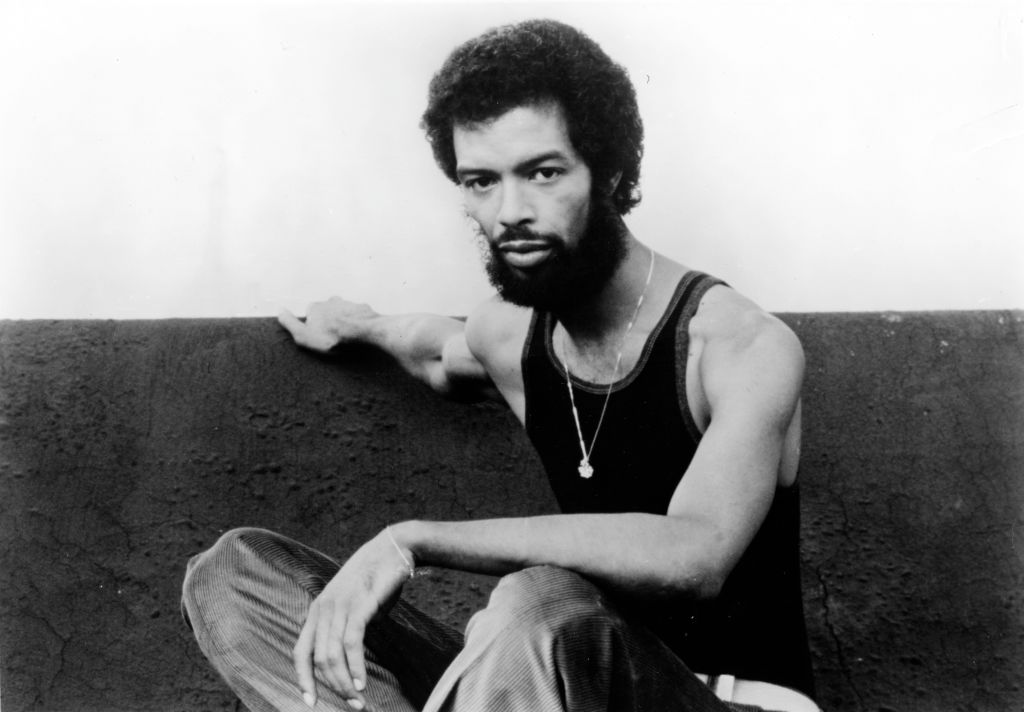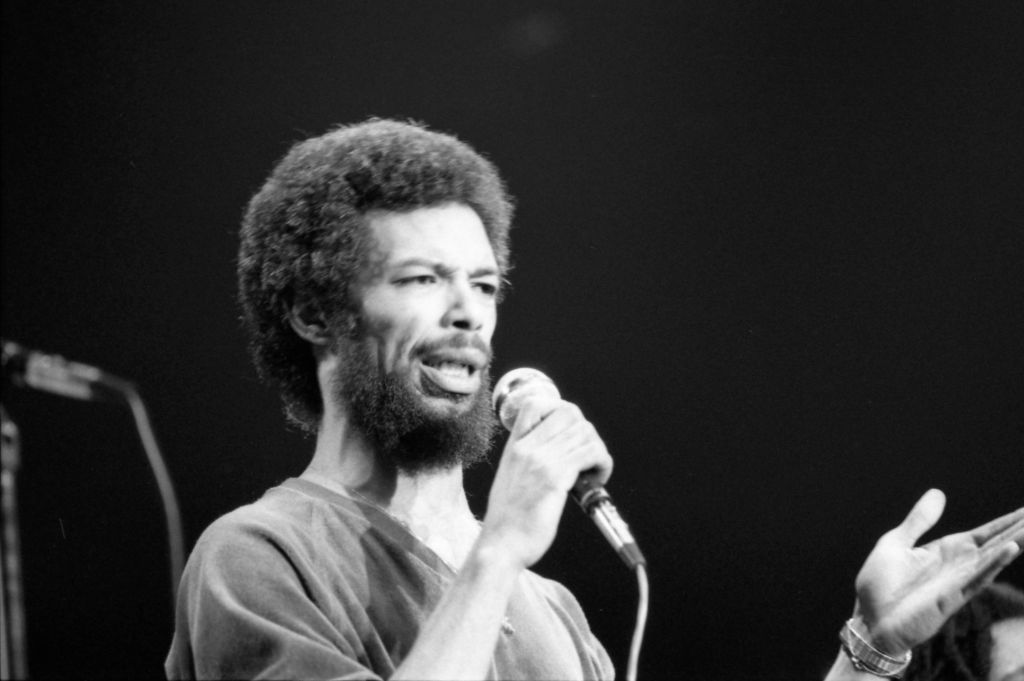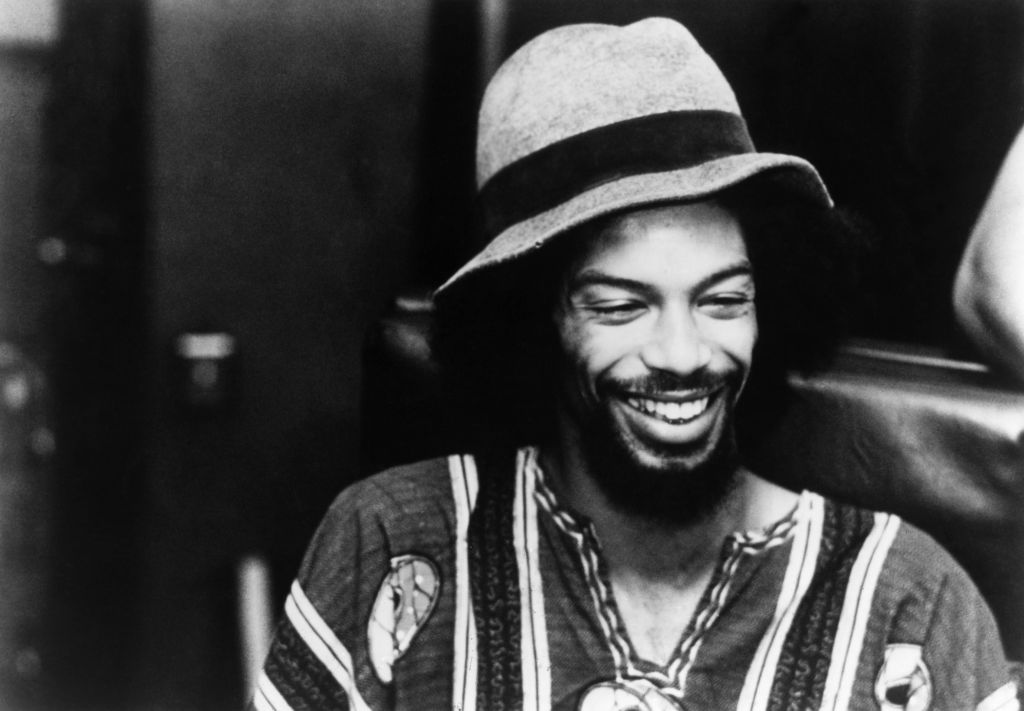Gil Scott-Heron (April 1, 1949 – May 27, 2011) was an American poet, musician, and author. He was known for his unique blend of spoken word poetry, soul, jazz, and blues music, often addressing social and political issues in his work. Scott-Heron's most famous composition is the spoken word piece “The Revolution Will Not Be Televised,” which became an anthem for the civil rights and black power movements of the 1960s and 1970s.

Born in Chicago, Illinois, Scott-Heron was raised primarily in Tennessee and New York City. He attended Lincoln University in Pennsylvania, where he met musician Brian Jackson, with whom he collaborated extensively throughout his career. In 1970, they released their first album, “Small Talk at 125th and Lenox,” featuring Scott-Heron's influential spoken word style.
Scott-Heron's music and poetry often explored themes of racism, inequality, and social justice. He used his art as a means of commentary and critique, and his work profoundly impacted subsequent generations of artists, particularly in the realm of hip-hop music. His style of blending poetry and music laid the foundation for the spoken word movement.
Throughout his career, Scott-Heron released numerous albums, including “Pieces of a Man” (1971), “Winter in America” (1974), and “The Revolution Will Not Be Televised” (1974). He continued to create music and perform until he died in 2011. Gil Scott-Heron's contributions to music and poetry earned him the title of “the godfather of rap”. They cemented his legacy as a significant figure in African-American culture and activism.
“The Revolution Will Not Be Televised” – This iconic spoken word piece is one of Scott-Heron's most famous compositions, delivering a powerful critique of media and consumer culture. The Revolution Will Not Be Televised” is a renowned and iconic phrase coined by Heron.
It originated from his spoken word piece of the same name, which has become one of his most famous compositions. The phrase and the accompanying poem gained significant popularity during the civil rights and black power movements of the 1960s and 1970s. It served as an anthem and rallying cry for those fighting against racial inequality and social injustice.
“The Revolution Will Not Be Televised” delivers a powerful critique of the media and consumer culture, challenging the notion that significant social and political changes can be neatly packaged and broadcasted through mainstream media channels. It highlights the need for active participation, grassroots movements, and genuine engagement to transform society.
The poem employs a vibrant and rhythmic spoken word style, accompanied by jazz and soul-infused music, characteristic of Gil Scott-Heron's artistic approach. It showcases his ability to merge poetry and music to convey powerful messages and engage listeners in thought-provoking social commentary.


Overall, “The Revolution Will Not Be Televised” represents the spirit of activism and the call for individuals to stand against injustice. It has endured as a timeless expression of resistance, a reminder that true change requires active involvement, and a rejection of passive consumption.
“Winter in America” – The title track from his 1974 album, this introspective song reflects on social and political issues prevalent at the time.
“Home Is Where the Hatred Is” – A haunting and poignant song that addresses drug addiction and the struggles faced by individuals in marginalized communities.
“Lady Day and John Coltrane” – This tribute to jazz legends Billie Holiday and John Coltrane showcases Scott-Heron's appreciation for their musical contributions.
“The Bottle” – A soulful and groovy track that delves into the themes of alcoholism and escapism.
“Pieces of a Man” – The title track from his 1971 album, this introspective song explores identity and the challenges faced by African Americans in society.
“Whitey on the Moon” – A satirical and scathing critique of racial inequality and the prioritization of space exploration over social issues.
“Angel Dust” – This thought-provoking song delves into the impact of drugs on individuals and communities, shedding light on the struggles faced by addicts.
“Johannesburg” – A collaboration with Hugh Masekela, this vibrant and rhythmic track protests against apartheid in South Africa.
“We Almost Lost Detroit” – Inspired by the partial meltdown of the Fermi 1 nuclear reactor near Detroit in 1966, this song highlights the dangers of nuclear power and its potential consequences.
These songs represent just a fraction of Gil Scott-Heron's extensive discography but showcase his poetic brilliance, social consciousness, and musical versatility.
Gil Scott-Heron faced several challenges throughout his life and career. Here are some of the key challenges he encountered:
Substance Abuse: Scott-Heron struggled with drug addiction, particularly cocaine. His addiction affected his personal life and career, leading to periods of instability and legal troubles.
Legal Issues: Scott-Heron faced legal challenges related to drug possession and other charges. These legal issues had a significant impact on his career and personal life.
Political Opposition: Scott-Heron faced opposition and criticism from those who disagreed with his views due to his outspoken nature and the politically charged nature of his work. His activism and socially conscious lyrics often made him a target for authorities and conservative critics.
Financial Difficulties: Despite his talent and influence, Scott-Heron faced financial struggles throughout his career. He encountered issues with record labels, poor management, and mismanagement of funds, which contributed to financial instability.
Personal Loss: Scott-Heron experienced personal loss, including the death of close friends and fellow musicians. The death of his long-time collaborator and pianist, Brian Jackson, in 1989 profoundly impacted him.
Despite these challenges, Scott-Heron continued to create powerful and influential music, impacting the world of music, poetry, and activism. His ability to confront and address these challenges through his art remains an important part of his legacy.
Gil Scott-Heron's music and artistry have influenced numerous artists across different genres. Here are some notable musicians and artists who his work has influenced:


Common: The Grammy-winning rapper has cited Gil Scott-Heron as one of his biggest influences, particularly in his socially conscious lyrics and fusion of spoken word and music.
Kendrick Lamar: Lamar, a highly acclaimed rapper and Pulitzer Prize winner, has acknowledged Gil Scott-Heron as a significant influence on his music, specifically citing the album “Pieces of a Man” as a source of inspiration.
Kanye West: West, a prominent figure in hip-hop, has referenced Gil Scott-Heron's work in his own music and has expressed admiration for his poetic style and social commentary.
Erykah Badu: The neo-soul singer has expressed her appreciation for Gil Scott-Heron's music, acknowledging him as a profound influence on her artistic journey.
The Last Poets: Often considered pioneers of the spoken word and poetry movement, The Last Poets drew inspiration from Gil Scott-Heron's fusion of poetry and music.
Jill Scott: The Grammy-winning R&B and soul singer-songwriter has acknowledged Gil Scott-Heron's impact on her music, particularly regarding his lyrical depth and social consciousness.
Talib Kweli: The acclaimed rapper and social activist has expressed his admiration for Gil Scott-Heron's artistry and highlighted his influence on his musical and lyrical style.
Lupe Fiasco: Fiasco, known for his introspective and thought-provoking lyrics, has cited Gil Scott-Heron as one of his influences, particularly regarding his ability to address social and political issues through music.
Gil Scott-Heron, born on April 1, 1949, was an American poet, musician, and author known for his powerful blend of spoken word poetry and music. His iconic composition “The Revolution Will Not Be Televised” became a rallying cry for the civil rights and black power movements of the 1960s and 1970s. Born in Chicago and raised in Tennessee and New York City, Scott-Heron attended Lincoln University, where he met collaborator Brian Jackson. Together, they released their first album, “Small Talk at 125th and Lenox,” in 1970, showcasing Scott-Heron's influential spoken word style.
Scott-Heron's music and poetry tackled themes of racism, inequality, and social justice, significantly influencing subsequent generations of artists, particularly in hip-hop music. His ability to blend poetry and music laid the foundation for the spoken word movement. Throughout his career, Scott-Heron released numerous albums, including “Pieces of a Man” (1971), “Winter in America” (1974), and “The Revolution Will Not Be Televised” (1974).
Despite facing challenges such as substance abuse, legal issues, political opposition, financial difficulties, and personal loss, Scott-Heron continued to create impactful music that resonated with audiences. His contributions to music and poetry earned him the title of “the godfather of rap” and solidified his place as a significant figure in African-American culture and activism.
Scott-Heron's influence extended to a wide range of artists. Notable musicians such as Common, Kendrick Lamar, Kanye West, Erykah Badu, The Last Poets, Jill Scott, Talib Kweli, and Lupe Fiasco have all been influenced by his work. His legacy continues to inspire artists and activists alike.
Gil Scott-Heron's discography boasts a vast collection of powerful and thought-provoking songs. Some of his notable tracks include “The Revolution Will Not Be Televised,” “Winter in America,” “Home Is Where the Hatred Is,” “Lady Day and John Coltrane,” “The Bottle,” “Pieces of a Man,” “Whitey on the Moon,” “Angel Dust,” “Johannesburg,” and “We Almost Lost Detroit.”
Gil Scott-Heron's artistic journey and contributions left an indelible mark on music, poetry, and activism. His fearless exploration of social and political issues and his innovative blend of spoken word and music made him a trailblazer and an inspiration for future generations.









